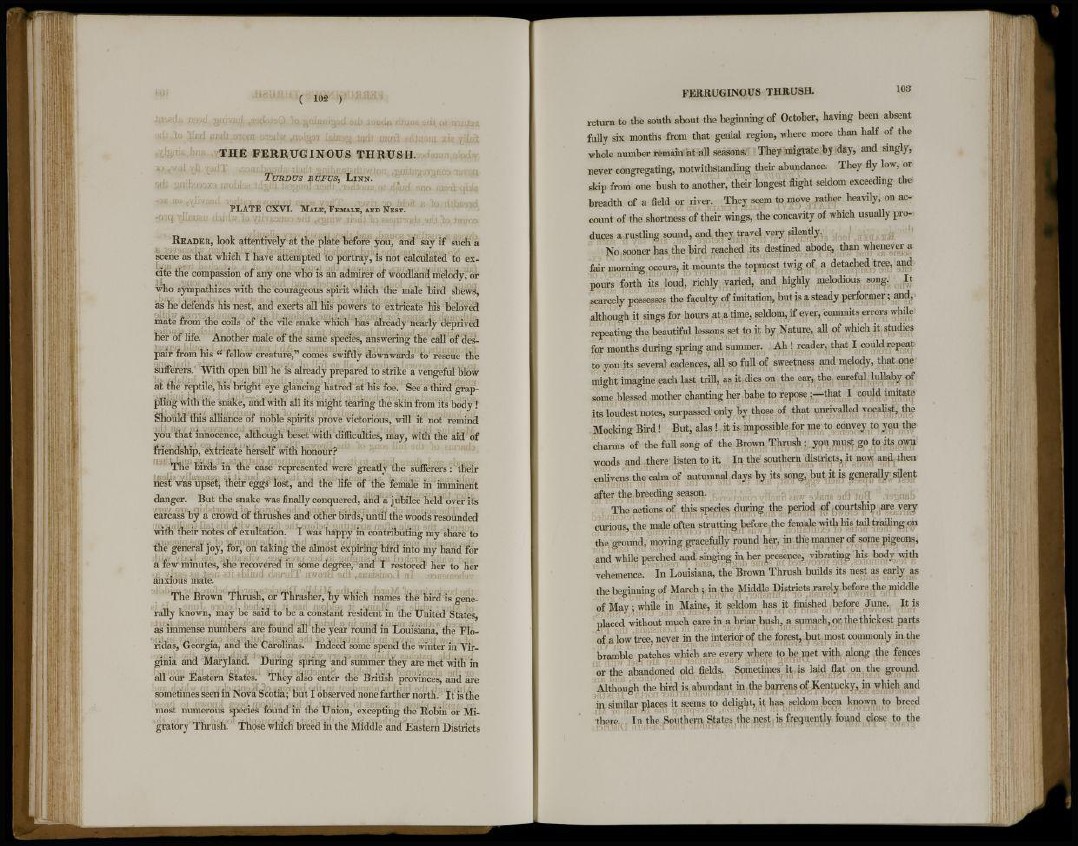
F E R R U G I N O U S T H R U S H . 103
return to the south about the beginning of October, having been absent
fully six months from that genial region, where more than half of the
whole number remain at all seasons. They migrate by day, and singly,
never congregating, notwithstanding their abundance. They fly low, or
skip from one bush to another, their longest flight seldom exceeding the
breadth of a field or river. They seem to move rather heavily, on account
of the shortness of their wings, the concavity of which usually produces
a rustling sound, and they travel very silently.
No sooner has the bird reached its destined abode, than whenever a
fair morning occurs, it mounts the topmost twig of a detached tree, and
pours forth its loud, richly varied, and highly melodious song. It
scarcely possesses the faculty of imitation, but is a steady performer; and,
although it sings for hours at a time, seldom, if ever, commits errors while
repeating the beautiful lessons set to it by Nature, all of which it studies
for months during spring and summer. Ah ! reader, that I could repeat
to you its several cadences, all so full of sweetness and melody, that one
might imagine each last trill, as it dies on the ear, the careful lullaby of
some blessed mother chanting her babe to repose ;—that I could imitate
its loudest notes, surpassed only by those of that unrivalled vocalist, the
Mocking Bird! But, alas ! it is impossible for me to convey to you the
charms of the full song of the Brown Thrush; you must go to its own
woods and there listen to it. In the southern districts, it now and then
enlivens the calm of autumnal days by its song, but it is generally silent
after the breeding season.
The actions of this species during the period of courtship are very
curious, the male often strutting before the female with his tail trailing on
the ground, moving gracefully round her, in the manner of some pigeons,
and while perched and singing in her presence, vibrating his body with
vehemence. In Louisiana, the Brown Thrush builds its nest as early as
the beginning of March ; in the Middle Districts rarely before the middle
of May; while in Maine, it seldom has it finished before June. It is
placed without much care in a briar bush, a sumach, or the thickest parts
of a low tree, never in the interior of the forest, but most commonly in the
bramble patches which are every where to be met with along the fences
or the abandoned old fields. Sometimes it is laid flat on the ground.
Although the bird is abundant in the barrens of Kentucky, in which and
in similar places it seems to delight, it has seldom been known to breed
T H E F E R R U G I N O U S THRUSH.
TURDUS RUFUS, LlNN.
94W %nibp,aa.X9 ^ o ^ i o a ^ ^ ^ ^ a c u - l i ^ ^ . ^ n j o ^ u } 48ff4 sao nwxu; quia
-ae no -vliv'.ead latbhi svom oi iimaa vsilT .lavh 'io Wtaft u dibasici
P L A T E C X V I . MALE, F E M A L E , A N D N E S T .
READER, look attentively at the plate before you, and say if such a
scene as that which I have attempted to portray, is not calculated to excite
the compassion of any one who is an admirer of woodland melody, or
who sympathizes with the courageous spirit which the male bird shews,
as he defends his nest, and exerts all his powers to extricate his beloved
mate from the coils of the vile snake which has already nearly deprived
her of life. Another male of the same species, answering the call of despair
from his " fellow creature," comes swiftly downwards to rescue the
sufferers. With open bill he is already prepared to strike a vengeful blow
at the reptile, his bright eye glancing hatred at his foe. See a third grappling
with the snake, and with all its might tearing the skin from its body !
Should this alliance of noble spirits prove victorious, will it not remind
you that innocence, although beset with difficulties, may, with the aid of
friendship, extricate herself with honour?
The birds in the case represented were greatly the sufferers: their
nest was upset, their eggs lost, and the life of the female in imminent
danger. But the snake was finally conquered, and a jubilee held over its
carcass by a crowd of thrushes and other birds, until the woods resounded
with their notes of exultation. I was happy in contributing my share to
the general joy, for, on taking the almost expiring bird into my hand for
a few minutes, she recovered in some degree, and I restored her to her
>,fi vj/uj anxiouys fmi£a itaea. a «Ji abliwd rfairidT nwomsdi .BRIBIGIUO J NL .sonomorfav
The Brown Thrush, or T hrasher, by which names the bird is generally
known, may be said to be a constant resident in the United States,
as immense numbers are found all the year round in Louisiana, the Floridas,
Georgia, and the Carolinas. Indeed some spend the winter in Virginia
and Maryland. During spring and summer they are met with in
all our Eastern States. They also enter the British provinces, and are
sometimes seen in Nova Scotia; but I observed none farther north. It is the
most numerous species found in the Union, excepting the Robin or Migratory
Thrush. Those which breed in the Middle and Eastern Districts